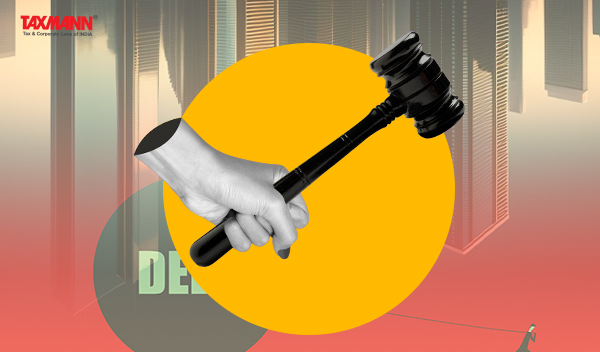Insolvency Plea u/s 95 Against Guarantor Admitted as Company Failed to Repay Debt and No Evidence of Payment Was Provided | NCLT
- Blog|News|Insolvency and Bankruptcy Code|
- 2 Min Read
- By Taxmann
- |
- Last Updated on 15 February, 2025

Case Details: State Bank of India v. Rahul Arunprasad Patel [2025] 171 taxmann.com 77 (NCLT-Ahd.)
Judiciary and Counsel Details
- Shammi Khan, Judicial Member & Sameer Kakar, Technical Member
-
Devang Nanavati, Sr. Adv & Ms Nitu Chaturvedi, Adv for the Appellant.
-
Arjun Seth, Ld. Adv., Rajiv Chawla, Advs & Sunil Kabra in Person for the Respondent.
Facts of the Case
In the instant case, the corporate debtor/principal borrower was granted credit facility by financial creditor/ applicant bank on 09.02.2016. The Respondent/personal guarantor had executed guarantee agreement in favor of financial creditor for the said credit facility.
However, the corporate debtor failed to maintain financial discipline due to which loan became irregular and corporate debtor was classified as NPA. Thereafter, on 02.06.2018, the financial creditor invoked Personal Guarantee.
Thereafter, a notice dated 20.10.2020 in Form B under Rule 7(2) of the Insolvency and Bankruptcy Rules was issued by financial creditor to the respondent. It was noted that since respondent failed to repay outstanding debt to financial creditor, the financial creditor filed an instant petition under section 95 of the IBC against respondent on 29.04.2021, i.e. within the limitation period.
Further, the Instant Tribunal appointed RP under section 97(5) of the Act and after examining all the details, he submitted report under section 99(1) of the Act, recommending for admission of the instant application under section 100 of the Act against the respondent.
NCLT Held
The NCLT held that RP’s report stated that no evidence was placed before him by the Respondent having paid the amount demanded by financial creditor and as such the entire amount demanded was unserviced as on the date of the order. In view of the foregoing, the instant petition was to be admitted.
Disclaimer: The content/information published on the website is only for general information of the user and shall not be construed as legal advice. While the Taxmann has exercised reasonable efforts to ensure the veracity of information/content published, Taxmann shall be under no liability in any manner whatsoever for incorrect information, if any.

Taxmann Publications has a dedicated in-house Research & Editorial Team. This team consists of a team of Chartered Accountants, Company Secretaries, and Lawyers. This team works under the guidance and supervision of editor-in-chief Mr Rakesh Bhargava.
The Research and Editorial Team is responsible for developing reliable and accurate content for the readers. The team follows the six-sigma approach to achieve the benchmark of zero error in its publications and research platforms. The team ensures that the following publication guidelines are thoroughly followed while developing the content:
- The statutory material is obtained only from the authorized and reliable sources
- All the latest developments in the judicial and legislative fields are covered
- Prepare the analytical write-ups on current, controversial, and important issues to help the readers to understand the concept and its implications
- Every content published by Taxmann is complete, accurate and lucid
- All evidence-based statements are supported with proper reference to Section, Circular No., Notification No. or citations
- The golden rules of grammar, style and consistency are thoroughly followed
- Font and size that’s easy to read and remain consistent across all imprint and digital publications are applied



 CA | CS | CMA
CA | CS | CMA
